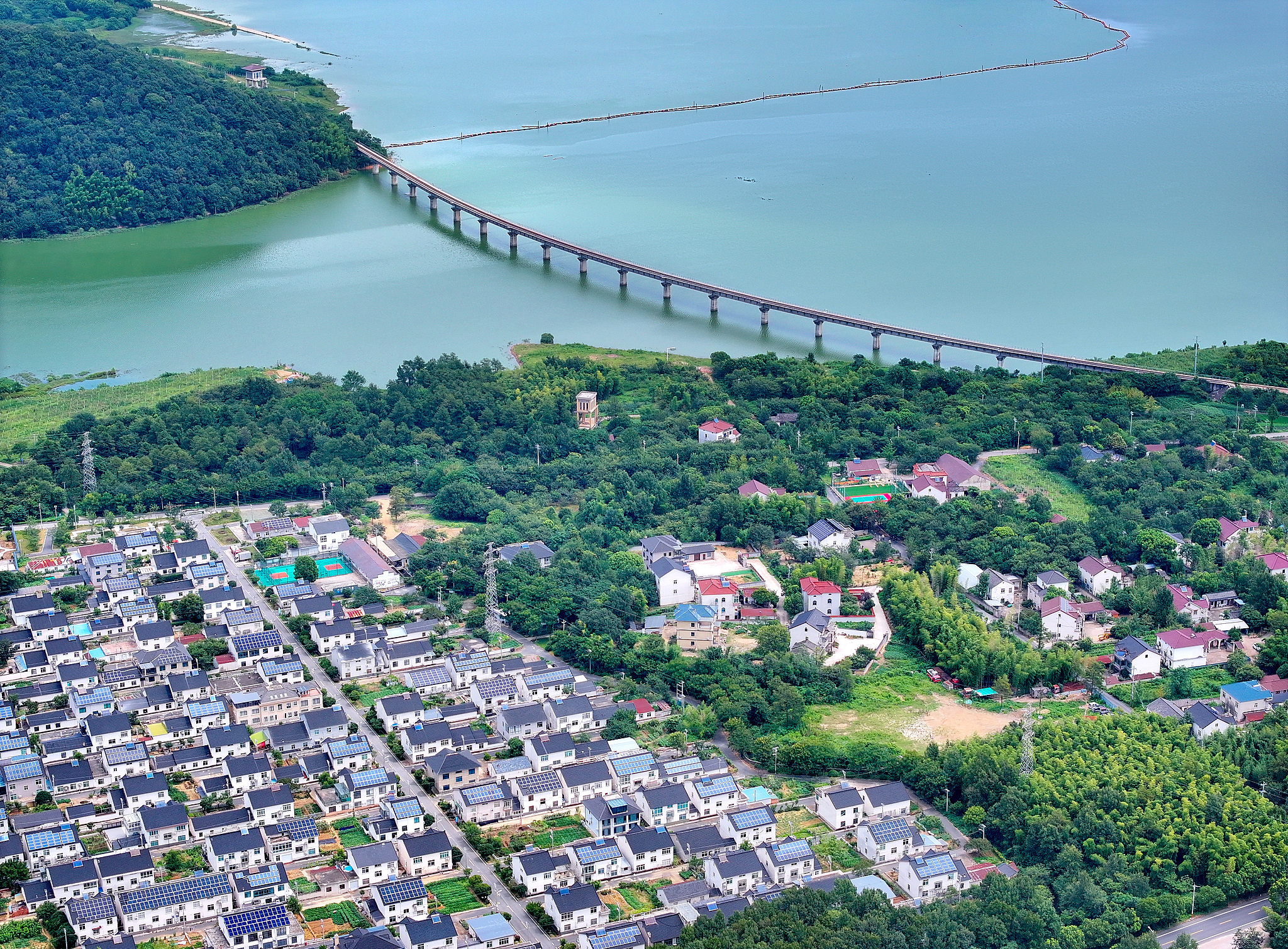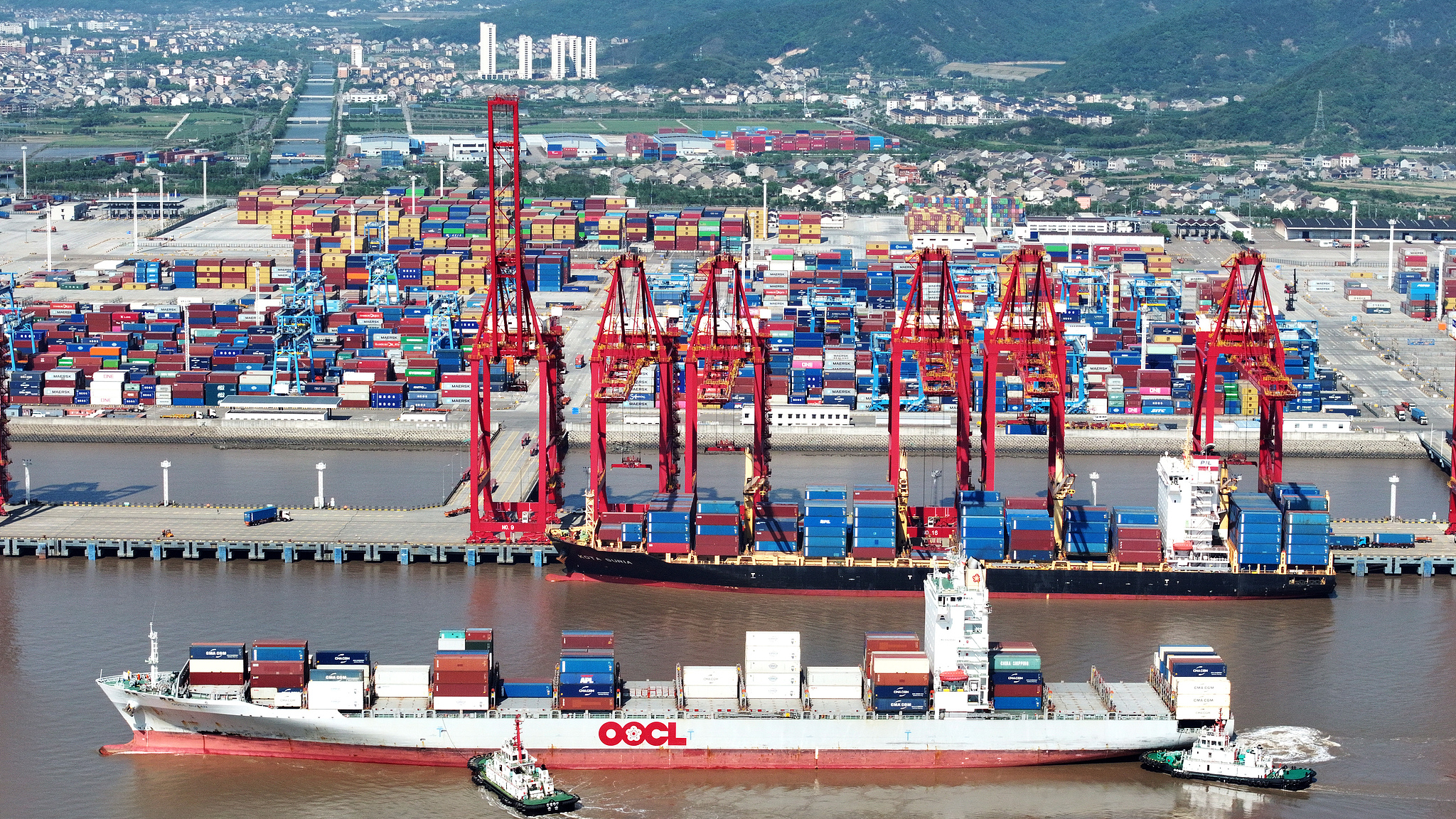
A view of Paodugang Village in Huzhou City, east China's Zhejiang Province, August 8, 2025. /VCG
As a microcosm of China's reform and opening up, east China's Zhejiang Province serves as a dynamic illustration of the country's efforts in advancing Chinese modernization.
Xi Jinping proposed the "Double-Eight Strategy" in 2003 when he was the secretary of the Communist Party of China Zhejiang Provincial Committee. Therein, he listed the province's eight advantages and eight areas of development in light of these advantages. Under the guidance of this strategy, the province has secured major advances in its economy, quality of life, social stability and ecology.
The strategy identifies eight strengths that Xi drew up for Zhejiang: economic structure, geological position, industries, coordinated development of urban and rural areas, ecology, mountain and ocean resources, environment, and culture.
The strategy is a tailor-made master plan for the development of Zhejiang. As the province is a symbol of China's high-quality development, its efforts in realizing common prosperity have made it a prime example.
Related stories:
'Lucid waters and lush mountains are invaluable assets': How China turns its green into gold
Tremendous change
Xi introduced the concept of "lucid waters and lush mountains are invaluable assets" when he was visiting Yucun Village in Zhejiang's Anji County in 2003. He praised the villagers' decision to shut down limestone mines and cement factories after they severely damaged the environment.
"Don't expect to promote economic growth at the cost of the environment because such economic growth doesn't equal development," said Xi, as he put forward the concept for the first time.
This concept reinforced Anji's commitment to an environment-friendly path to growth. Over the years, it has become a cornerstone of Xi's thought on ecological civilization.
With the "Double-Eight Strategy" profoundly embodying the concept, Zhejiang continues to transform its ecological advantages into development advantages through green development policies, ecological and environmental protection, eco-friendly economic growth and the development of beautiful rural areas.
The province develops collaborative innovation zones to reduce pollution and carbon emissions. Starting with cities, parks, enterprises and other areas, Zhejiang has promoted the integrated planning, deployment, promotion and assessment of carbon emission and pollution reduction efforts to reap environmental, climate and economic benefits.
Zhejiang has been committed to building itself into a "big garden." In 2019, the province was recognized as the first ecological province in China. In 2023, the first National Ecology Day events were held in Zhejiang. The Green Rural Revival Program and the Blue Circle program that focuses on marine plastic waste treatment won the United Nation's Champions of the Earth award, successively.
In June 2003, Zhejiang launched the Green Rural Revival Program, which aimed to renovate about 10,000 incorporated villages and transform about 1,000 central villages among them into examples of moderate prosperity in all respects.
Thanks to the program, the image of the countryside has been comprehensively lifted in Zhejiang Province. A total of 2,170 featured villages and over 3 million beautiful rural courtyards have been built.
Meanwhile, Zhejiang has consistently deepened the "Thousand Villages Demonstration and Ten Thousand Villages Renovation" project, supported the high-quality development of mountainous and island counties, and leveraged the integration of basic public services as a breakthrough point to further reduce disparities between regions, urban and rural areas, and incomes.
According to the Survey Office of the National Bureau of Statistics in Zhejiang, in 2024, the per capita disposable income of rural residents in the province reached 42,786 yuan (around $5,943), maintaining first place among all provinces and regions for 40 consecutive years.
By the end of 2022, more than 90 percent of villages in Zhejiang have completed the "Beautiful Village in the New Era" program. The province had established 70 demonstration counties, 724 demonstration towns and 743 scenic routes, bringing beautiful ecology, economy and life to villagers.

A view of the Ningbo-Zhoushan Port in Ningbo, east China's Zhejiang Province, April 15, 2025. /VCG
Booming economy
Zhejiang once faced what might be called "growing pains." Heavy resource consumption, low-end and fragmented industries, and disorganized development made the province hit bottlenecks.
During his work in Zhejiang, Xi made a number of inspection tours across the province, gaining a more comprehensive and accurate understanding of the advantages and disadvantages, experiences and problems of various regions and sectors in Zhejiang. The "Double-Eight Strategy" gradually took shape in his mind.
During an inspection tour in Zhejiang in 2015, Xi said the proposal of the strategy was not some spur-of-the-moment idea, but a well-researched development strategy – one that focused on two key questions: how to leverage strengths and how to address weaknesses.
Guided by the "Double-Eight Strategy," Zhejiang has vigorously developed the digital economy, accelerated the construction of a global advanced manufacturing base, and promoted institutional opening up. The province has witnessed remarkable changes in economic growth, serving as a pioneer in boosting high-quality development and advancing Chinese modernization.
Zhejiang's GDP jumped from 800 billion yuan in 2002 to 9.01 trillion yuan in 2024 – ranking at the forefront among provinces, autonomous regions and municipalities in China. The Ningbo-Zhoushan Port saw its cargo throughput exceed 1.37 billion tonnes in 2024, ranking first globally for the 16th consecutive year.
In 2024, Zhejiang's total import and export volume reached 5.3 trillion yuan, marking a 7.4 percent increase year on year. Exports totaled 3.9 trillion yuan, up 9.5 percent year on year, accounting for 15.3 percent of China's total export share and maintaining its position as the nation's second-largest exporter, according to Zhejiang Provincial Bureau of Statistics.
Private economy made outstanding contributions to the high-quality development of Zhejiang. The province has ranked first in the country for 26 consecutive years for the number of top-500 private enterprises.
Notably, Yiwu, a city known as "the world's supermarket," serves as a vital link, connecting more than 2.1 million Chinese enterprises with over 230 countries and regions worldwide. It is often seen as a barometer of global consumer demand.
The resilience of the "world's supermarket" echoed a robust 5.3 percent year-on-year growth in China's GDP in the first half of the year.
The "Double-Eight Strategy" has become a comprehensive blueprint and top-level design for the province's long-term development, leading Zhejiang to achieve a systematic and profound transformation.
阅读原文:https://news.cgtn.com/news/2025-08-14/How-China-s-Zhejiang-makes-solid-strides-in-high-quality-development-1FO0bJDlu2A/p.html